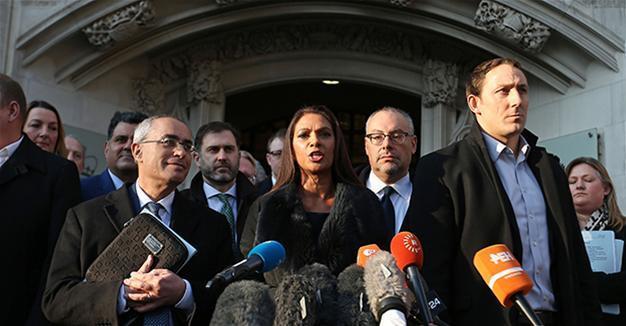Parliament must vote before UK can trigger Brexit, top court rules
LONDON

AFP photo
British Prime Minister Theresa May must give parliament a vote before she can formally start Britain’s exit from the European Union, the U.K. Supreme Court ruled on Jan. 23, giving lawmakers who oppose her Brexit plans a shot at amending them.By a majority of eight to three, the U.K.’s highest judicial body decided May could not use executive powers known as “royal prerogative” to invoke Article 50 of the EU’s Lisbon Treaty and so begin two years of divorce talks.
“The referendum is of great political significance, but the Act of Parliament which established it did not say what should happen as a result,” said David Neuberger, President of the Supreme Court.
“So any change in the law to give effect to the referendum must be made in the only way permitted by the U.K. constitution, namely by an Act of Parliament.”
However, the judges did remove one major potential obstacle for the British government, saying May did not need the approval of the U.K.’s devolved assemblies in Scotland, Wales and Northern Ireland before triggering Brexit.
May has said she intends to invoke Article 50 before the end of March but the ruling means she must now first bring forward urgent legislation before she can go ahead.
Meanwhile, Malta’s Deputy Prime Minister and EU minister, Louis Grech, told Reuters on Jan. 23 that Britain told EU peers it would stick to an end-March deadline to trigger its exit clause from the bloc.
A spokesperson for May said Jan. 23 hours after court ruling that Britain still intended to start talks on leaving the European Union by the end of March.
“The British people voted to leave the EU, and the government will deliver on their verdict -- triggering Article 50, as planned, by the end of March,” the spokesman said.
“Today’s ruling does nothing to change that.”
“We respect the Supreme Court’s decision, and will set out our next steps to parliament shortly,” the spokesman added.
Brexit minister David Davis said that the U.K. would shortly introduce legislation to trigger Brexit and planned to stick to March timeline.
In its ruling the court said such a bill, which is likely to be put to parliament either later this week or next week, could be a “very brief statute.”
That opens up the Brexit process to scrutiny from lawmakers, the majority of whom had wanted to stay in the EU. However, the main opposition Labour Party said it would not block Brexit although it would try to amend the legislation.
“Labour will seek to build in the principles of full, tariff-free access to the single market and maintenance of workers’ rights and social and environmental protections,” said party leader Jeremy Corbyn.
Media reports have suggested that up to 80 Labour lawmakers in the 650-member House of Commons lower chamber would ignore Corbyn and vote against triggering Article 50, while the small Liberal Democrat Party said it would oppose Brexit unless there was a second referendum on the final deal.
Meanwhile, the Scottish National Party, which has 54 MPs, vowed to put forward 50 “serious and substantive” amendments. However, the opponents of Brexit are still likely to be some way short of the numbers needed to either delay May’s timetable or to stop it.
The upper chamber, the House of Lords, could also seek to amend the plans but ministers are confident that unelected peers would not try to stop Britain leaving the EU.
















